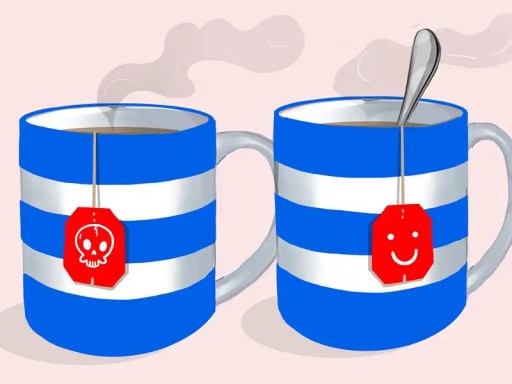This week’s Feedback column (that I write) in New Scientist magazine has six segments. Here are bits of each of them: Sweet or not, the end — Almost everyone who gets old dies. In a gross way, that brief sentence could sum up a Dutch/Danish/British study called “Use of sugar in coffee and tea and long-term risk of […]
Tag: sugar
Tea sugar, Packaging philosophy, Leftist food (Bento), Superpower
This week’s Feedback column (that I write) in New Scientist magazine has four segments. Here are the beginnings of each of them: A spoonful of sugar? — Should one take sugar in one’s tea? Feedback is mindful of two things about this question. For one, nearly everyone, in the UK especially, considers (or pretends to consider) the […]
The special Children issue of the Improbable magazine
The special Children issue (volume 27, number 5) of the magazine, Annals of Improbable Research, has flown its way to subscribers. This special issue, like many other special issues of the magazine, is also available for purchase. All the issues are in the form of downloadable PDFs. Are you a Child? Whether you are a […]
Does this count as cannibalism?
The headline in the Los Angeles Times reads “Teen baked her grandfather’s ashes into sugar cookies and brought them to school, police say.” Does this count as cannibalism? The question arises because one month ago the 2018 Ig Nobel Prize for nutrition was awarded to James Cole of the University of Brighton, for calculating that the […]
The Lovejoy Comet (Cock)Tail – a festive recipe
Improbable’s Call for Papers on “The nutritional value of comets” Mini-Annals of Improbable Research, Issue Number 1994-02, June, 1994, is still open. For inspiration with your submissions, what better time is there to prepare a Lovejoy Comet (Cock)Tail? Here is the recipe – inspired by chemical components that are all readily available on Comet Lovejoy […]
Cyanide moths – ok snack for kids
Some types of moth, notably the Zygaena genus, can contain significant quantities of cyanide, raising the question ‘Is it a good idea to eat them?’ The question has particular relevance since the moths are a traditional favourite snack amongst children from the Carnia region of Italy. The children like to eat the moths´ingluvies (roughly equivalent […]
How volcanologists define “spatter”
Golden syrup might not be the first material to spring to mind if you were after an experimental analogue with which to investigate the effects of ‘spatter’ around typical Hawaiian basaltic volcano eruptions. But spring it did to the mind of researchers Sumner, Blake, Matela, and Wolff, as recorded in a 2005 paper for the […]
A cheerfully depressing investigation: “Which Placebo to Cure Depression?”
This study pokes a pointed stick into lots of questions about medicine, science, and scholarship. The lead author writes (in a note to us) that “It addresses a paradox in modern medicine: antidepressants are often considered to be mere placebos [1] despite the fact that meta-analyses are able to rank them [2]: it follows that it […]
Bushman on Sweets (2): Sugar, Sugar, Sugar, Sugar, Sugar, Sugar, Sugar, Sugar, Sugar
If you like to read about sugar or about aggressiveness, Brad J. Bushman [pictured here] and colleagues have a study perhaps worth some moments of your time: “Sweetened blood cools hot tempers: physiological self-control and aggression,” C. Nathan DeWall, Timothy Deckman, Matthew T. Gailliot, Brad J. Bushman, Aggressive Behavior, 2011 Jan-Feb;37(1):73-80. The authors explain: “Aggressive […]
Converting cocaine into sugar, tequila into diamonds
The Synthetic Remarks blog tells of a new study about how to convert sugar into cocaine: Cocaine from sugar If your local dealer insists on cutting your dope with sugar, you should be aware that there is a fix for it now. Specifically, if the sugar is pure D-ribose and the desired dope is (—)-cocaine, which is […]

